|
|
|
Sort Order |
|
|
|
Items / Page
|
|
|
|
|
|
|
| Srl | Item |
| 1 |
ID:
133430


|
|
|
|
|
| Publication |
2014.
|
| Summary/Abstract |
This paper analyses anti-corruption efforts in post-conflict Liberia. It highlights citizens' views on the definition of corruption and argues that, in the past, anti-corruption efforts have often focused on institution building and formal justice mechanisms without sufficient understanding of accountability dynamics on the ground. Anti-corruption approaches in Liberia have only nominally examined whether there is a shared understanding of what 'corruption' is and why it is regarded as a problem. The paper examines the social norms and perceptions that underlie understandings of the term corruption. It argues that the international community may have overlooked the fact that 'corruption' has become an all-encompassing term that masks a myriad of differing priorities and concerns. The authors posit that 'accountability' may be a more useful lens for those actors hoping to improve governance in these contexts.
|
|
|
|
|
|
|
|
|
|
|
|
|
|
|
|
| 2 |
ID:
134293
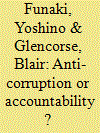

|
|
|
|
|
| Summary/Abstract |
This paper analyses anti-corruption efforts in post-conflict Liberia. It highlights citizens’ views on the definition of corruption and argues that, in the past, anti-corruption efforts have often focused on institution building and formal justice mechanisms without sufficient understanding of accountability dynamics on the ground. Anti-corruption approaches in Liberia have only nominally examined whether there is a shared understanding of what ‘corruption’ is and why it is regarded as a problem. The paper examines the social norms and perceptions that underlie understandings of the term corruption. It argues that the international community may have overlooked the fact that ‘corruption’ has become an all-encompassing term that masks a myriad of differing priorities and concerns. The authors posit that ‘accountability’ may be a more useful lens for those actors hoping to improve governance in these contexts.
|
|
|
|
|
|
|
|
|
|
|
|
|
|
|
|
| 3 |
ID:
175558
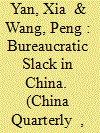

|
|
|
|
|
| Summary/Abstract |
This article presents a qualitative empirical study of the impact of corruption and anti-corruption on the efficiency of China's bureaucratic system in developing a local economy. Drawing on 40 in-depth interviews and 98 days of participant observation, it first investigates the significance of extravagant position-related consumption in building personalized bureaucratic ties (patronage networks) and mobilizing resources for local economic development. It then examines the causal link between President Xi's campaign against corruption and extravagance and the rise of bureaucratic slack in local governments. The anti-extravagance campaign reduces the level of corruption in local government but it discourages local officials, who are motivated primarily by the desire to avoid risk and ensure political survival, from using banquets and gift-giving to build patronage networks, attract investment and mobilize development resources. The article concludes that corruption may contribute positively to the efficiency of a fragmented Chinese bureaucracy in fostering development at the local level, while the anti-corruption campaign compels local cadres to develop a new coping strategy – bureaucratic slack – for implementing policies and developing local economies.
|
|
|
|
|
|
|
|
|
|
|
|
|
|
|
|
| 4 |
ID:
162354
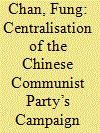

|
|
|
|
|
| Summary/Abstract |
Following the initiation of the policy of ‘Reform and Open Door’, the possibilities for public officials to trade power for private gain in China increased. To tackle the problem of corruption, different levels of Discipline Inspection Commissions (DICs) in the Chinese Communist Party (CCP) initiated investigation related to various corruption cases. However, due to the nature of the administrative set-up in China, the local DICs could not effectively carry out their functions. As a result, the Central Commission for Discipline Inspection (CCDI) was compelled to take on a bigger role, including controlling personnel appointments in local DICs and dispatching inspection teams to local jurisdictions. This strategy also enabled the central government and the top leadership of the CCP to build up a positive image with respect to fighting corruption. Nevertheless, the discretionary power of the top party leaders that has been enhanced through these centralisation measures leads to doubts over the real motives behind the CCP’s anti-corruption efforts. In March 2018, the National Supervision Commission (NSC) was established as the highest governmental anti-corruption agency, but more time is needed to judge the effectiveness of this new institution.
|
|
|
|
|
|
|
|
|
|
|
|
|
|
|
|
| 5 |
ID:
166640


|
|
|
|
|
| Summary/Abstract |
This paper argues that corruption protection arises because a central feature of Iraq’s institutional environment is its factionalised political system between groups (i.e. sectarian affiliation), and these groups both protect their members from corruption charges launched by other groups, and collude to protect each other from prosecution of corruption. The paper defines corruption protection as ‘action carried out to prevent perpetrators of corruption from being brought to justice’, which is a systematic attempt among corrupt agents seeking to evade accountability for primary corruption activity. The paper has identified two contrasting paths taken by these groups in power in the dynamics of corruption protection: (a) The competitive mode is illustrated by spurious allegations of corruption made by some groups against other groups. Tension between factions results in fake charges being brought against rivals which sometimes lead to wrongful imprisonment of the innocent; (b) collusive between intra-factional groups, corruptly conspiring to hide each other’s corrupt acts thereby constructing a shield which protects the entire elite in Iraq, an issue which I label ‘solidarity in corruption’. The paper will conclude that despite the apparent strength of anti-corruption framework, the reality tells us a very different story; the multiple institutions established to fight corruption and the system of accountability can also constitute a means for corruption protection.
|
|
|
|
|
|
|
|
|
|
|
|
|
|
|
|
| 6 |
ID:
186467


|
|
|
|
|
| Summary/Abstract |
Collusive contracting with private power plants in Bangladesh has resulted in high power prices that cost the taxpayer around U$1 billion in subsidies. The main driver of collusive contracting is the unwillingness of politically unconnected firms to engage in a high-risk environment. To attract investment, the government has adopted a targeted risk absorption strategy that negotiates mark-ups with interested firms. We argue that this strategy cannot discover the minimum mark-up that would induce investment. Moreover, because only politically connected investors are likely to be bidding and negotiating, this approach encourages investors to set high mark-ups. An alternative strategy is competitive risk-mitigation that provides contestable subsidies from development finance institutions (DFIs), such as preferential finance and partial risk guarantees. Contestable subsidies work by reducing risks of unconnected investors, encouraging their participation to make collusion more difficult, and constraining mark-ups. To test our hypothesis, we collect a dataset on plant-level DFI support and prices from 58 private power plants in Bangladesh from 2004 to 2017. Our empirical analysis finds that financing instruments with contestable subsidies from DFIs are associated with a 26% reduction in plant-level prices controlling for plant capacity, size, and fuel type.
|
|
|
|
|
|
|
|
|
|
|
|
|
|
|
|
| 7 |
ID:
175057
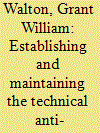

|
|
|
|
|
| Summary/Abstract |
Scholars have sought to explain how and why developing countries establish anti-corruption agencies by examining the strength of national and international institutions, particularly political institutions and actors, international donors and civil society. This article argues that these explanations are inadequate and that explaining the nature of anti-corruption reform in developing countries requires accounting for the transnational technical anti-corruption assemblage. This assemblage comprises individuals, ideas and things that reinforce technical solutions to corruption. This article examines the case of anti-corruption reforms in Solomon Islands during and after the international Regional Assistant Mission to Solomon Islands (RAMSI) intervention (2003–2017). It shows that parliamentarians passed anti-corruption reforms despite declining pressure from donors, relatively weak civil society and wavering political commitment. The article suggests a transnational coalition of national and international actors and objects helped establish and maintain a technical anti-corruption assemblage. Through exclusionary practices, this assemblage helped maintain the technical and apolitical nature of anti-corruption reform. Findings provide insights into the effectiveness of anti-corruption ‘policy transfer’ in Solomon Islands and other developing countries.
|
|
|
|
|
|
|
|
|
|
|
|
|
|
|
|
| 8 |
ID:
169793
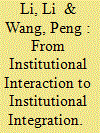

|
|
|
|
|
| Summary/Abstract |
How does the establishment of the National Supervisory Commission affect China's capacity to curb corruption? Using published materials and fieldwork data, this article addresses this question by comparing the newly established anti-corruption agency with the previous dual-track system. It first examines the previous system by focusing on four dimensions of the interaction between the Commission for Discipline Inspection (CDI) and the People's Procuratorate: complementarity, convergence, competition and conflict. Although the CDI and the procuratorate compensated for each other's deficiencies, competition and conflicts between the two institutions were rife, reducing the efficiency of China's anti-corruption work. The article then investigates what impact the establishment of the National Supervisory Commission has had on China's capacity to combat corruption. This new model strengthens the Party's capacity to curb corruption, and the focus of the anti-corruption work has shifted from punishment to prevention, but the Party still needs to resolve three types of unbalanced power relations: between supervision, prosecution and trial; between central and local authorities; and between the state and citizens.
|
|
|
|
|
|
|
|
|
|
|
|
|
|
|
|
| 9 |
ID:
130184
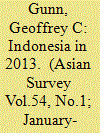

|
|
|
|
|
| Publication |
2014.
|
| Summary/Abstract |
Ahead of upcoming elections, expectations ran high in 2013 across the archipelago for a highly pluralistic electorate. With China as a leading trading partner, the backdrop for Indonesia was steady economic growth, albeit checked by a sliding currency, a current account deficit, and a depressing culture of corruption. Mixing commerce and geopolitics, China, the U.S., and Japan all turned to Indonesia to expand their influence.
|
|
|
|
|
|
|
|
|
|
|
|
|
|
|
|
| 10 |
ID:
174652


|
|
|
|
|
| Summary/Abstract |
This article applies and expands on a typology of organizational corruption control to analyze the various mechanisms used to address corruption within the Fédération Internationale de Football Association (FIFA). It uses case study evidence in tandem with insights from neo-institutional theory to construct a conceptual framework in which corruption control types are more completely examined within their broader institutional context. Using this framework, the article shows how the persistence of corruption in FIFA and its checkered reform process are attributable to an organizational filtering phenomenon that has limited the operation of internal and external corruption controls. Finally, it discusses some implications of this framework for transnational organizational governance reform.
|
|
|
|
|
|
|
|
|
|
|
|
|
|
|
|
| 11 |
ID:
144078
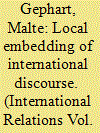

|
|
|
|
|
| Summary/Abstract |
The international and transnational anti-corruption campaign (ITACC) has successfully called global attention to the ‘abuse of delegated power for private gain’. However, several anti-corruption scholars have argued that the currently dominant ITACC is flawed because it ignores the fact that local understandings of corruption vary around the world. Others who have analysed the ITACC have claimed it is capable of effectively covering up these differences, in turn creating misunderstandings about the aims in the fight against corruption. While both arguments have been developed quite separately, this article combines and thereby advances both. It applies constructionist interviews and argumentative discourse analysis (ADA) to explore the local anti-corruption discourse in Chile – a country that is considered a success case in Latin America. The exploration shows that Chile’s anti-corruption activities are highly political and they are deeply related to narratives of the country’s transition to democracy. By relating these narratives back to the ITACC, the article reveals a complex interplay between local (competing) corruption narratives and the ITACC.
|
|
|
|
|
|
|
|
|
|
|
|
|
|
|
|
| 12 |
ID:
167067


|
|
|
|
|
| Summary/Abstract |
Singapore exemplifies what China strives for: resilient authoritarianism despite advanced development with good governance and political stability. But lessons Chinese observers draw from the Southeast Asian city-state have been selective, leading to misconceptions. We focus on three key areas in which Chinese observers claim inspiration from the “Singapore model.” The first, Singapore's “Asian values” discourse which is seen to provide an ideological defense of non-democratic rule, overestimates the impact of top-down conservative culturalism while underestimating the difficulty of propagating Confucianism in officially still communist China. Second, while elections in Singapore are seen to bolster the ruling People Action Party's legitimacy in Singapore, they have been implemented to such a limited extent in China that any legitimation gain is unlikely. Finally, the chief lesson derived from Singapore's fight against corruption, the importance of a committed leadership, ignores the importance of the rule of law in Singapore, a legacy of colonialism very different from China's post-totalitarian trajectory.
|
|
|
|
|
|
|
|
|
|
|
|
|
|
|
|
| 13 |
ID:
068272


|
|
|
| 14 |
ID:
082923


|
|
|
|
|
| Publication |
2008.
|
| Summary/Abstract |
This article offers a novel contribution to the terrorism literature by using mathematical modeling and case studies to demonstrate how terrorist and extremist groups can utilize social service provision activities and anti-corruption campaigns instead of violent activities to gain support.The basic argument of the model is that terrorist groups will try to gain support by promising that they will be better distributors of resources than the current regime once they gain power and by promising that they will be less corrupt. However, because all organizations can freely make these promises, their words are cheap talk, and the general population should ignore them. To overcome this problem, organizations must offer a costly signal. Provision of social goods and implementation of explicit anti-corruption campaigns before taking power serves as such a signal. As the United States government and its allies widen their "war on terrorism," they must consider the ramifications of social service provision and anti-corruption activities, which are common, effective, and potentially useful for increasing the probability of group success.
|
|
|
|
|
|
|
|
|
|
|
|
|
|
|
|
| 15 |
ID:
068920


|
|
|
| 16 |
ID:
142840
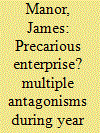

|
|
|
|
|
| Summary/Abstract |
During its first year in power (2014–15), the government of Narendra Modi in India showed itself to be a precarious enterprise. The prime minister was beset by multiple antagonisms. He radically centralised power. This has enabled him to get some things done swiftly, but it has weakened him by choking off reliable information flows from below and by sowing discontent among his party and his supporters. An exercise in fiscal decentralisation to the state level in this federal system ran counter to his centralisation, but on close examination, it proved less than generous. His efforts to tackle two problems—bureaucratic paralysis and high-level corruption—contradicted one another. His efforts to transcend the ambiguities which ensnare every prime minister were unrealistic and triggered further discontent among party colleagues. Finally, his handling of religious polarisation became entangled in multiple antagonisms—between the expectations of Hindu nationalists (and his own legacy as a polariser) and his duty to maintain social cohesion; between political gains to be made from polarisation and political costs that attend it; between polarisers who sought to strengthen his hand and those who sought to polarise in order to undermine him.
|
|
|
|
|
|
|
|
|
|
|
|
|
|
|
|
| 17 |
ID:
098332


|
|
|
|
|
| Publication |
2010.
|
| Summary/Abstract |
This article examines the recent emergence of China's private investigation industry, focusing on investigators of spousal infidelity. It outlines the professed business rationales of private investigators that target women experiencing marital crises, including claims that they provide a necessary social service, protect women's rights, promote anti-corruption measures, and uphold Chinese law. It also details growing criticisms of China's "infidelity sleuths" for violating Chinese law and citizens' rights. Finally, the article examines some of the proposed responses to the problems associated with private investigators and the policing of infidelity. The demand for such services highlights the laissez-faire position that economic reform has increasingly forced China's governmental authorities to assume with regard to regulating the private affairs of Chinese citizens.
|
|
|
|
|
|
|
|
|
|
|
|
|
|
|
|
| 18 |
ID:
076401


|
|
|
|
|
|
|
|